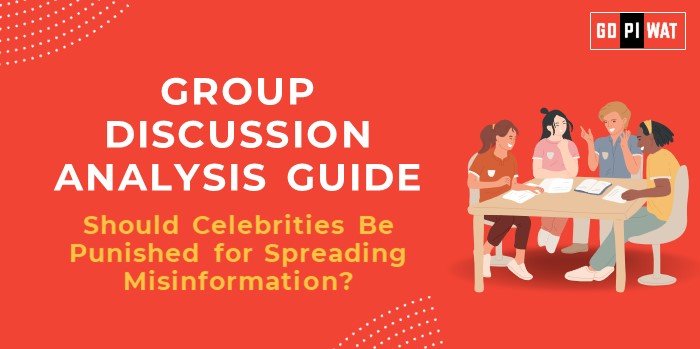📋 Group Discussion Analysis Guide
Should Celebrities Be Punished for Spreading Misinformation?
🌐 Introduction to the Topic
- Opening Context: In today’s hyper-connected world, the role of celebrities as influential figures is under intense scrutiny, especially when they share misinformation. This discussion evaluates accountability in a digital age.
- Topic Background: Celebrities, as public figures, possess vast platforms influencing millions. However, when they share unverified or false claims, the consequences can range from public panic to tarnishing societal discourse. Recent debates, spurred by celebrity tweets during the COVID-19 pandemic or political campaigns, underscore the importance of this issue.
📊 Quick Facts and Key Statistics
🌍 Global Social Media Users: 4.8 billion (2024) – Illustrates the massive reach of celebrity influence.
💸 Misinformation Impact: $78 billion annual economic loss due to fake news (WEF, 2023).
🙋♂️ Influence Rate: 63% of youth trust celebrities over traditional experts (Pew Research, 2023).
🏥 Case Study: Celebrity-endorsed misinformation led to a 15% drop in vaccine uptake in some regions (WHO, 2021).
💸 Misinformation Impact: $78 billion annual economic loss due to fake news (WEF, 2023).
🙋♂️ Influence Rate: 63% of youth trust celebrities over traditional experts (Pew Research, 2023).
🏥 Case Study: Celebrity-endorsed misinformation led to a 15% drop in vaccine uptake in some regions (WHO, 2021).
👥 Stakeholders and Their Roles
- 🏛️ Government: Enforce legal frameworks for online accountability and misinformation laws.
- 🌐 Social Media Platforms: Regulate and fact-check posts, including those from influential users.
- 🎤 Celebrities: Exercise caution, verify sources, and promote responsible communication.
- 👨👩👧👦 General Public: Cultivate critical media literacy to discern credible information.
🏆 Achievements and ⚠️ Challenges
🏆 Achievements
- 📜 Legal Frameworks: Countries like Germany have implemented fines for platforms failing to remove fake news.
- 🙏 Celebrity Apologies: High-profile cases of public retractions (e.g., promoting pseudo-science).
- 📢 Awareness Campaigns: Increased public education on misinformation detection.
⚠️ Challenges
- ⚖️ Freedom of Expression: Balancing punishment with First Amendment rights in democratic nations.
- 🌎 Global Standards: Variance in misinformation laws across countries.
- 🔓 Platform Loopholes: Limited enforcement mechanisms on private accounts.
🌍 Global Comparisons
🇩🇪 Germany: NetzDG law imposes hefty fines for misinformation online.
🇺🇸 US: Struggles with aligning free speech and misinformation accountability.
🇮🇳 India: A celebrity’s tweet on unproven COVID cures resulted in a 30% surge in demand for ineffective remedies.
🇺🇸 US: Struggles with aligning free speech and misinformation accountability.
🇮🇳 India: A celebrity’s tweet on unproven COVID cures resulted in a 30% surge in demand for ineffective remedies.
💡 Structured Arguments for Discussion
- ✅ Supporting Stance: “Celebrities have immense influence, and when they misuse their platforms, penalties ensure accountability and deter harm.”
- ❌ Opposing Stance: “Punishing celebrities infringes on free speech and sets a dangerous precedent for subjective censorship.”
- ⚖️ Balanced Perspective: “While punishment may deter misinformation, fostering education and proactive measures is equally vital.”
🗣️ Effective Discussion Approaches
📌 Opening Approaches
- 📊 Data-Driven Start: “With $78 billion lost annually due to misinformation, the accountability of influencers is critical.”
- 📚 Case Study Introduction: “Consider the 2021 incident where a celebrity-endorsed false cure led to a public health crisis in India.”
🔄 Counter-Argument Handling
- 💬 “Freedom of expression must include responsibility; misinformation causes tangible harm.”
- ⚖️ “Punishments can target misinformation without silencing legitimate opinions.”
🔍 Strategic Analysis of Strengths and Weaknesses
SWOT Analysis
- 💪 Strengths: Deterrent impact of penalties; promotes responsible influence.
- 📉 Weaknesses: Difficulty in enforcement; risks of overreach.
- 🚀 Opportunities: Partnerships for digital literacy.
- ⚡ Threats: Polarization of opinion; potential misuse of laws.
📚 Connecting with B-School Applications
- 💼 Real-World Applications: Corporate communication strategies; ethics in leadership.
- ❓ Sample Interview Questions:
- “How can corporations balance influencer partnerships with ethical responsibilities?”
- “What lessons can leaders learn from celebrity misinformation incidents?”
- 💡 Insights for B-School Students: Explore crisis management strategies and the interplay of ethics and influence.


